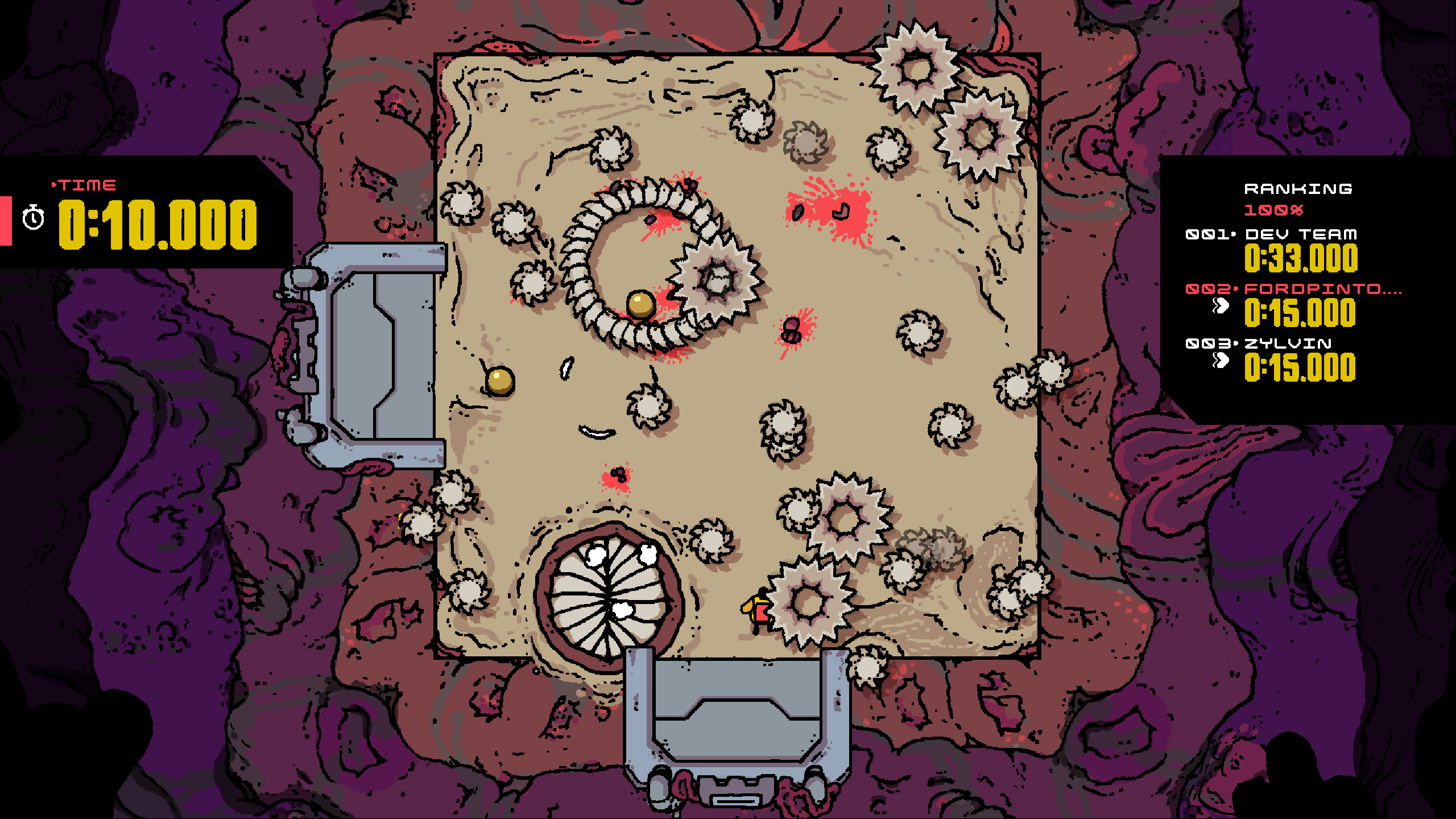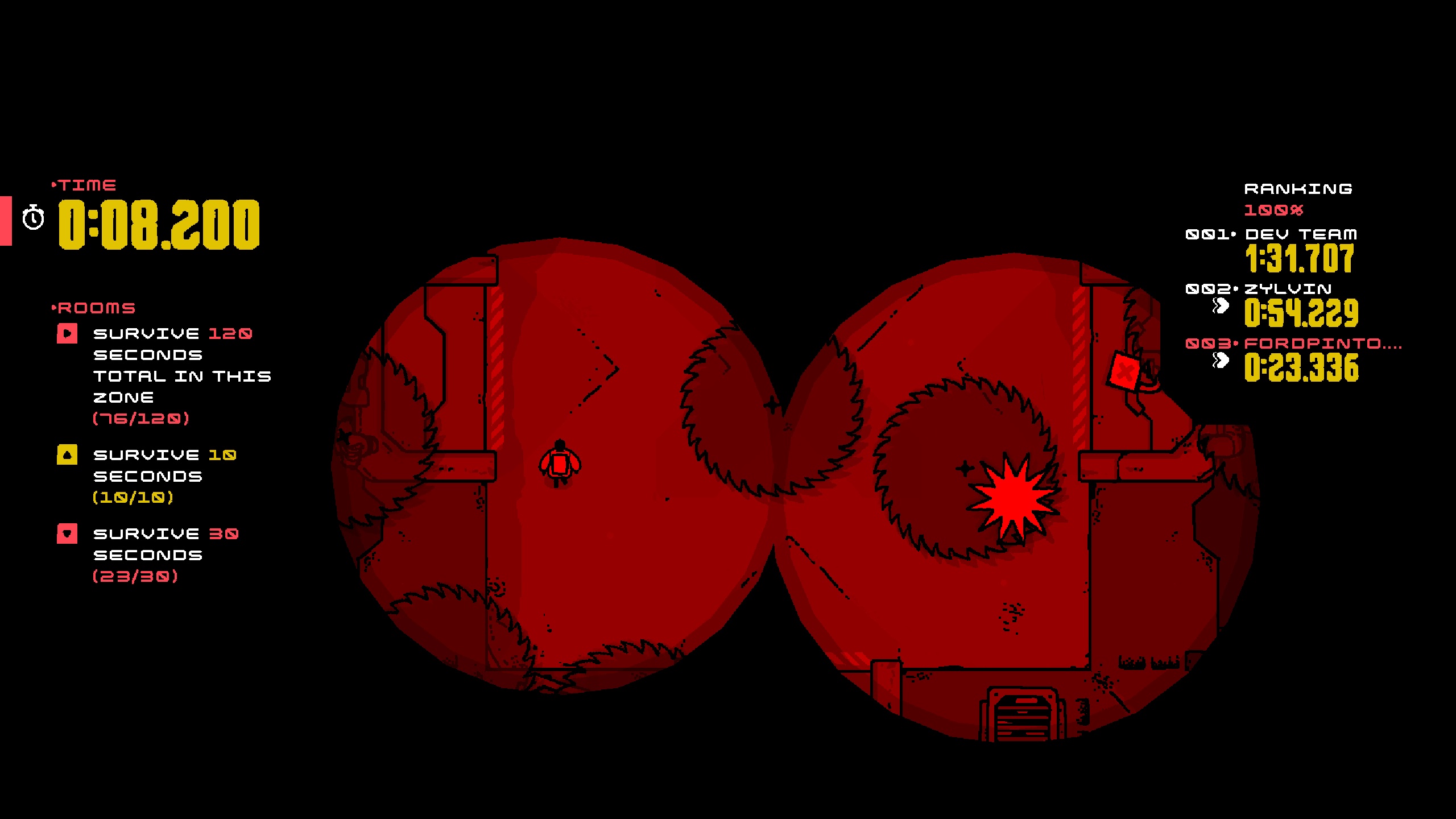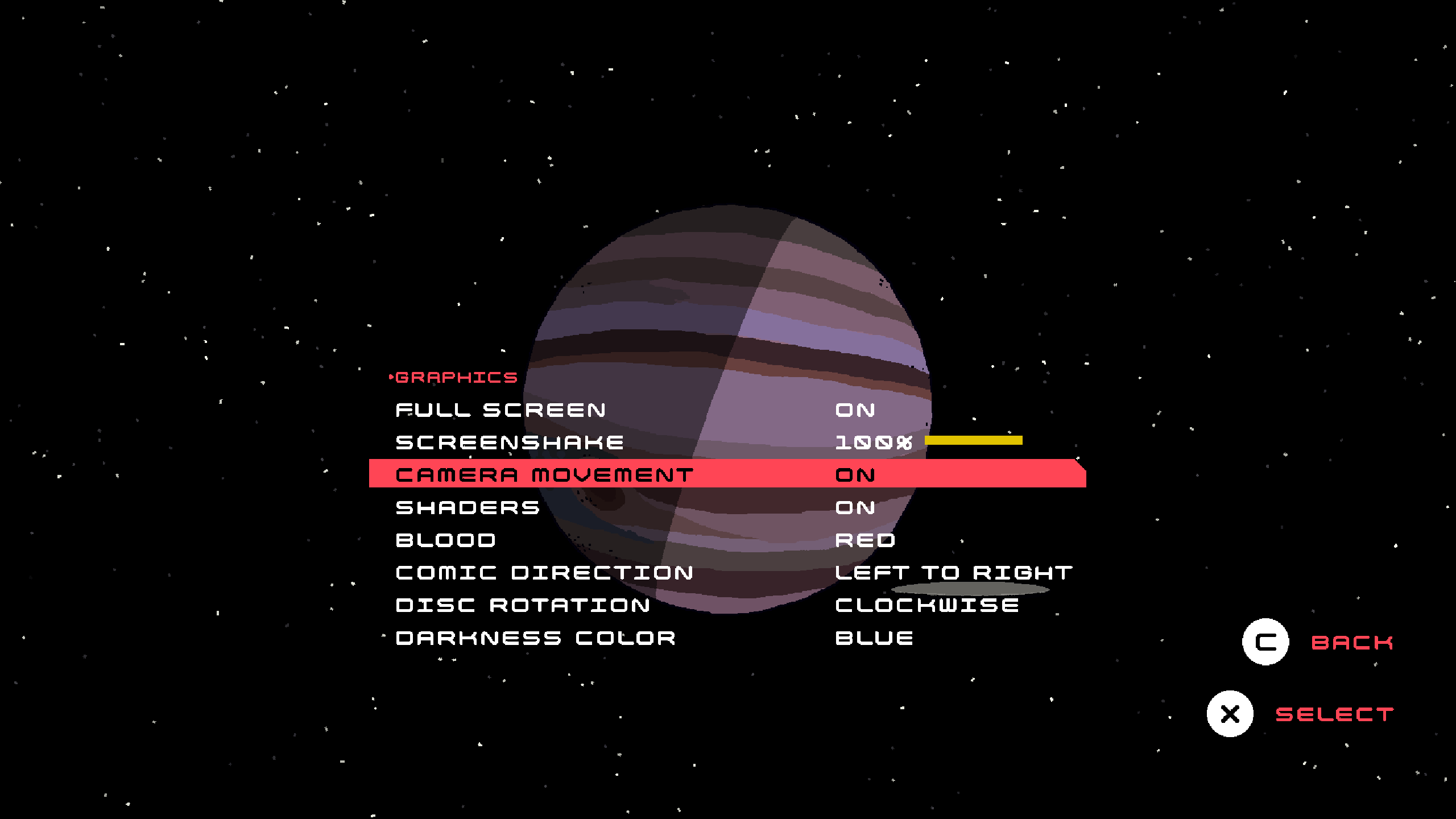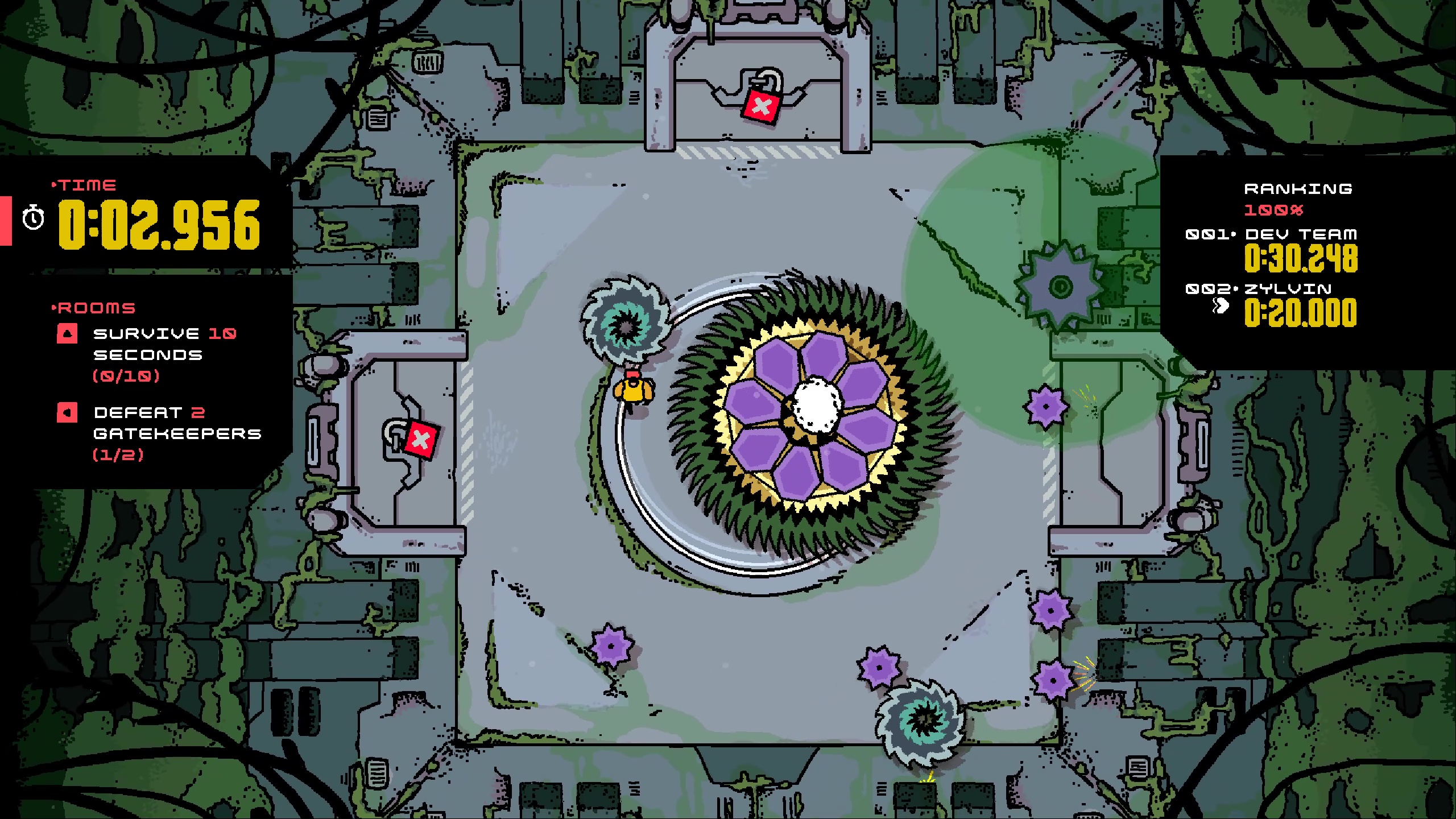Our Verdict
Disc Room provides hours of high-stress fun for daring adventurers, and a few mysteries to solve.
PC Gamer's got your back
What is it? A 2D game about evading deadly spinning discs.
Expect to pay $15/£12
Developer Kitty Calis, Jan Willem Nijman, Terri Vellmann and Doseone
Publisher Devolver Digital
Reviewed on Windows 10, Intel Core i5-9600K, 16GB RAM, Nvidia RTX 2070 Super
Multiplayer? Nope, but there are leaderboards
Out: October 22
Link: Official site
Like Downwell, a game in which you go down a well, Disc Room's title says what it is: a game about rooms full of discs. The discs bounce around inside square, 2D rooms, and you've got to maneuver a little guy around so that he doesn't get hit by them, because one hit turns him to bloody goo. There's no fighting the discs. They will eventually make you goo, and you're scored by how long you stay alive in each room. It's simple enough, at least until you get to the room where time doesn't exist.
At first sight, I thought Disc Room was an attempt to find the purest form of the videogame saw blade hazard, so to speak. I imagined it would start with one disc and escalate things in a regulated, straightforward way so that I could test my disc-dodging skills in a dojo-like environment. But at one point I had to fill a room with clones of myself and feed them to a disc that was trying to hide from me, so clearly my prediction was a little off. Disc Room is weird and arcane. You might figure it all out in six hours, but I haven't, even though I did beat the final boss. What do I do about that timeless room? I still don't know.

There are many other rooms that are simple, where you run away from an increasing number of spinning discs while a timer records your score. Survive for long enough—say, 20 seconds—and you'll unlock the door to another room. It's fun to play this simple concentration game, although I can see why Disc Room quickly elaborates on the idea with special abilities, boss fights, and mysteries. The thought of surviving an extra 0.3 seconds of disc hell isn't very enticing once you've had a decent run. Some rooms introduce new disc types if you stay alive long enough, but no disc is interesting enough to let that be the sole motivation.
So, things get weirder as you go. Not all rooms can be unlocked by scoring well in the adjacent room. Some require you to complete a bigger objective, like getting killed by a certain number of unique disc types (an annoying collection task), or by solving stranger mystery objectives. The room timers change between areas, too. In some rooms, the only way to add seconds to the clock is to collect little Pac-Man morsels. In others you have to stand in a central circle or the clock stops.
In boss levels, collecting those Pac-Man dots also does damage to the boss, in a sense. The first few 'guardians' aren't too hard to beat, but then there's one where I swear it's designed so that you almost always die just before collecting the last of the many, many dots you need. The boss itself is a giant, spiked disc that wanders around the room, and it's joined by a gang of over a dozen sawblades, as well as sandworms that pop out of the ground. It's tricky, and you'll die a lot. But that's fine: Starting the level again is like eating another pretzel. You probably should've stopped five minutes ago, but it only takes a fraction of a second, so you do it before your internal monologue can tell you not to.
It's exhausting, but exhilarating to spend time on the edge of my capacity to think ahead.
Special abilities help with the increasingly difficult rooms. A few are mostly useless except to solve certain puzzle rooms you'll run into as you explore the modest map (there are 52 rooms, and then a reverse hard run after you beat it). The abilities you'll use most are Dash, which lets you briefly run through discs without dying, Slow, which slows down time, and Mirror, which teleports you to your mirror location on the map (tricky, because it's mirrored horizontally and vertically, and you might teleport into a disc if you're not careful).
These abilities make it possible to survive for at least 20 seconds in some of the cruelest rooms, including a few where the lights strobe on and off, and one that is pitch black (unless you figure out the trick). They also screw me up a lot. In the early levels, my focus is entirely on where the discs are and whether they're going to hit me. Add an ability, and then I'm also focused on deciding when and how to use it, so I'm likely to get gutted by one disc while thinking about dodging over another. And when I also have to collect dots or step on all the floor tiles (another complication in certain rooms), there's a third thing holding my attention. It's like I'm braiding these three strands of attention into rope, and I have to braid faster and faster as the level progresses. If I forget where the next strand goes, just for a millisecond, the rope instantly frays and I'm dead. It's exhausting, but exhilarating to spend time on the edge of my capacity to think ahead.

Some frustrations: I don't see why touching the edge of a map should slow me down. It gets me killed and doesn't feel like my fault. I also still haven't figured out how to deal with that timeless room, and I know someone's going to figure it out instantly and then tell me it was obvious. Screw that person. Also, the slow fields that occasionally come into play suck. Messing with my movement is an intrusive way to add difficulty.
Some cool stuff: There are granular difficulty settings, so if you get frustrated and just want to get on with it you can slow the game down, or just the discs, or keep everything the same but make the objectives easier. Or if you want to make things harder for yourself, when you start a new run challenge conditions are tracked, such as 'only unlock one ability' and 'never die in under 10 seconds.' A convenient scoreboard tells me how much better or worse I've done than my friends. And I love the thick-lined art, which gives the impression of a hand-stapled indie comic made in an out-of-date version of Photoshop—something I'd be prone to buying if I saw it at a comic shop, even though I know I don't need to collect more things. The music sets a nice and spooky space mood, too.

There's not much to report on the technical side. The graphics options are: full screen, yes or no, and then settings for things like camera shake and blood color. The controls are remappable, and it works fine with WASD, but it's a controller game for me—analog stick recommended.
The best fun I have in Disc Room comes from dodging your basic, DVD logo screensaver-style bouncing saw blades. The homing blades and ghost blades and other special blades make the game harder, but predicting plain old bounce patterns has a purity that I like. It's the way to the trance zone (briefly, because you never last long in Disc Room), whereas the sniper-discs that zoom at me set a more aggressive mood. The contrast is interesting, at least. And so is that timeless room, and the other mysteries aboard the horrible disc ship. Disc Room's surprises keep it from being a series of mechanical time trials. It's a charmingly inscrutable little comic book, and it'll be loved for that, both by casual adventurers and speed runners who want to master its quirks.
Disc Room provides hours of high-stress fun for daring adventurers, and a few mysteries to solve.

Tyler grew up in Silicon Valley during the '80s and '90s, playing games like Zork and Arkanoid on early PCs. He was later captivated by Myst, SimCity, Civilization, Command & Conquer, all the shooters they call "boomer shooters" now, and PS1 classic Bushido Blade (that's right: he had Bleem!). Tyler joined PC Gamer in 2011, and today he's focused on the site's news coverage. His hobbies include amateur boxing and adding to his 1,200-plus hours in Rocket League.


